




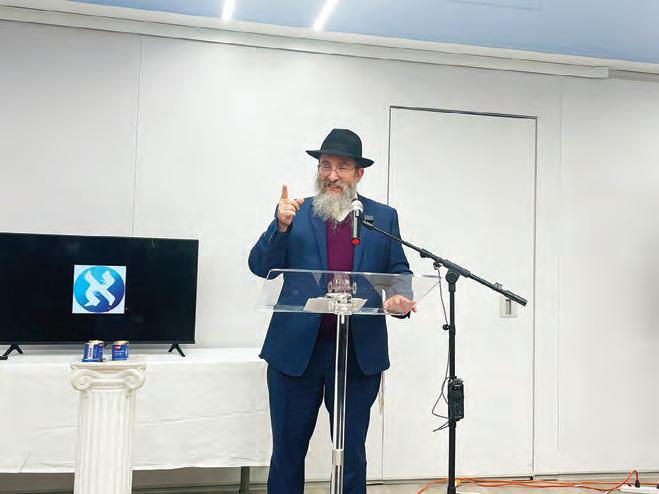




| Senior Sta Writer
alya Lubit, a Pittsburgh Jewish woman, pled guilty at a May 15 hearing in federal court to conspiracy to commit an offense against the United States and damaging or defacing religious property.
Lubit, 24, was arrested last year with Mohamad Hamad in connection with graffiti painted on both Chabad of Squirrel Hill and the Jewish Federation of Greater Pittsburgh. In April, the federal government filed a superseding indictment and added Micaiah Collins as a defendant for her alleged role in building bombs with Hamad, a former member of the Pennsylvania National Guard and Hamas sympathizer.
Collins’ father is Chad Collins, a pastor at Valley View Presbyterian Church and national organizer with the anti-Israel group Friends of Sabeel North America. Her sister Nesta Collins took part in last summer’s encampments at the University of Pittsburgh. She was arrested and charged with obstructing law enforcement and disorderly conduct at the encampment, which her father also attended.
Lubit originally pled not guilty but accepted a plea deal about two weeks after the superseding indictment was filed.
In the nearly hour-long May 15 hearing, Lubit answered questions posed by U.S. District Judge Christy Criswell Wiegand affirming she understood the charges and the gravity of the plea.
Several times during the hearing, Lubit conferred with her attorney, Jennifer H. Bouriat, about a particular charge or point Criswell Wiegand made before affirming that she understood the question that the judge had asked.
At one point, the attorneys and defendant met with the judge at a side bar after Lubit said she had seen both a therapist and psychiatrist since her arrest but was uncomfortable listing in open court any medication she may have been prescribed.
The charges carry a maximum penalty of one year imprisonment, $100,000 in fines and one year of supervised release.
As part of the plea deal, Lubit will pay nearly $11,000 in restitution — $5,000 to Chabad of Squirrel Hill, $5,092 to the Jewish Federation of Greater Pittsburgh and $442 to the City of Pittsburgh. Any additional penalties will be decided during a Sept. 10 sentencing hearing following the completion of a presentence report and recommendation prepared by the parole board.
By David Rullo | Senior Sta Writer
llegheny County Controller Corey
O’Connor defeated incumbent Mayor Ed Gainey in Pittsburgh’s May 20 mayoral Democratic primary. With nearly 100% of the votes counted, O’Connor claimed 31,254 votes, or roughly 53% of the total vote, while Gainey had 27,907 votes, or about 47% of the vote.
O’Connor will face Republican Tony Moreno, a retired police officer, in the general election. Moreno beat Thomas West in the GOP primary. No Republican has served as the city’s mayor since 1933.
In O’Connor’s victory speech, given shortly before 11 p.m., he thanked his family, supporters and Pittsburgh voters.
“Your voices and calls for accountable leadership and growth have been heard in this Democratic primary,” he said.
O’Connor also thanked Gainey for his service to Pittsburgh, saying, “His love for this city has never been in doubt.”
After calling for unity among Democrats, O’Connor, whose late mother was Jewish, highlighted a theme that resonated throughout his campaign: It’s time for the city to deliver for its residents.
“Deliver a police force that is large enough to support our residents, and have a chief of police,” O’Connor said. “Enough housing so that anyone can afford to live here in Pittsburgh and support businesses of all sizes so that we can grow and create wealth all over our city.”
After the race was called for O’Connor, Gainey offered words of congratulation, but those words were met with scattered boos from those in attendance at his campaign headquarters. The mayor pushed back.
“[We’re] not going to spread hate. We have enough hate in this city,” he said.
Instead, Gainey highlighted the coalition of supporters built during his time in office.


By Adam Reinherz | Senior Staff Writer
In lieu of donning yarmulkes, former synagogue-goers wore hard hats upon reentering Congregation B’nai Israel. The once majestic domed venue, which last held Jewish services in 1995 and now goes by “The Rotunda,” briefly opened for a May 15 fundraiser.
Hosted by Bloomfield-Garfield Corporation, owners of the former B’nai Israel sanctuary, the event featured live music, catered food and tributes.
Rick Swartz, Bloomfield Garfield’s executive director, described the evening as a “kickoff to what’s going to be a four-year odyssey in getting this building restored as a community owned and managed arts, education and event center.”
Since purchasing the building from Beacon Communities in December for $598,100, Bloomfield-Garfield has administered minor repairs to the site while establishing a timeline toward a bigger project.
“We’re at the point now where we can begin some initial improvements this fall, and then hopefully by the fall of 2026 we’re well underway to bringing the basic systems back to the building: electrical, plumbing, heating and air conditioning — and possibly, if we can — replacing the roof,” Swartz said.
A subsequent phase, which would commence in 2027, involves restoring the interior and constructing a multipurpose space with flexible seating.
“We’re trying to create a facility that’s basically a public commons,” Swartz said. Whether event organizers wish to hold

political fora, environmental meetings, discussions on education or virtually any topic, the goal is establishing a venue that “breaks down barriers and brings people from different cultures, different ethnic backgrounds, different political philosophies, together.”
Swartz, who joined Bloomfield-Garfield in 1981, likened the finished project to the Jewish Community Center in Squirrel Hill.
“It would bear a lot of similarities,” he said. “We won’t have the classroom space, we won’t have the recreation amenities that the JCC has. But the spirit and the intent for this building would be very parallel.”
Located at 327 Negley Ave., The Rotunda would serve residents of neighborhoods including Stanton Heights, Highland Park, Morningside, Friendship and Bloomfield.
“We need a space here that will be kind of a bulwark against the notion that these neighborhoods are going to somehow gentrify and become something on the order of San Francisco in the next 25-30 years,” Swartz said. “This building is going to be a symbol of our effort to keep these neighborhoods open to everybody, affordable for as many people as we can accommodate, and really stitch urban legend together that will for the next 60-70 years speak to why we think these neighborhoods are so special.”

SUBSCRIPTIONS
subscriptions@pittsburghjewishchronicle.org
412-687-1000, ext. 2
TO ADVERTISE advertising@pittsburghjewishchronicle.org 412-687-1000, ext. 1
EDITORIAL DEPARTMENT
Email: newsdesk@pittsburghjewishchronicle.org
BOARD OF TRUSTEES
Evan H. Stein, Chair
Evan Indianer, Vice Chair
Derek Smith, Treasurer
Gayle R. Kraut, Secretary
Gail Childs, Dan Droz, Malke Steinfeld Frank, Seth Glick, Tammy Hepps, Judith Kanal, Cátia Kossovsky, Charles Saul
GENERAL COUNSEL
Stuart R. Kaplan, Esq.
Jim Busis, CEO and Publisher 412-228-4690 jbusis@pittsburghjewishchronicle.org
EDITORIAL Toby Tabachnick, Editor 412-228-4577 ttabachnick@pittsburghjewishchronicle.org
Adam Reinherz, Senior Staff Writer 412-687-1000 areinherz@pittsburghjewishchronicle.org
David Rullo, Senior Staff Writer 412-687-1000 drullo@pittsburghjewishchronicle.org
ADVERTISING Amy Weiss, Account Executive (412) 613-0697 aweiss@pittsburghjewishchronicle.org
Pittsburgh City Councilperson Khari Mosley called the May 15 kickoff a “multicultural moment.”
“It’s not just Jewish folks that are here in this amazing synagogue celebrating the reuse of this space. It’s also about sustainability, and the reuse of a space, and bringing a space back to life that has meant so much to so many generations of Pittsburghers,” he said.
Mosley spent much of the evening celebrating with other Pittsburghers — those who prayed at B’nai Israel decades ago and those who hope to create new memories within the venue.
“Being a Black Pittsburgher and understanding a special connection that Black Pittsburgh, that Jewish Pittsburgh, have — this is a way to reconnect to that. It’s important in this moment that that reconnection is focused on,” he said.
Opened in 1924, B’nai Israel’s circular sanctuary could accommodate 1,000 worshippers. Attendees of the May 15 event learned about the room as well as the congregation’s history from a video narrated by Sara Stock Mayo. Playing near the building’s entrance, the short film included a series of vintage stills.
Pittsburgh Mayor Ed Gainey, one of several politicians who attended the event, called the former worship hall a “great asset for the community.”
“You can still feel the spirit when you are in there,” he said. “The positive spirit that you have here, the new rehabilitation that’s going here, the history that this building has created, the history that will be told — the future of the building and what’s going on — it’s a positive story for the whole city.”
5915 Beacon St., 5th Floor Pittsburgh, PA 15217
Main phone number: 412-687-1000
Subscriptions: 412-687-1000, ext. 2
PRODUCTION
Jeni Mann Tough
Production Manager
Carl Weigel
Art/Production Coordinator
Subscriptions subscriptions@pittsburghjewishchronicle.org 412-687-1000, ext. 2
Published every Friday by the Pittsburgh Jewish Publication and Education Foundation 5915 Beacon St., 5th Floor Pittsburgh, PA 15217
Phone: 412-687-1000
POSTMASTER:
Send address change to PITTSBURGH JEWISH CHRONICLE, 5915 BEACON ST., 5TH FLOOR PITTSBURGH, PA 15217 (PERIODICAL RATE POSTAGE PAID AT PITTSBURGH, PA AND AT ADDITIONAL MAILING OFFICES) USPS 582-740

Manuscripts, letters, documents and photographs sent to the Pittsburgh Jewish Chronicle become the property of this publication, which is not responsible for the return or loss of such items.
The Pittsburgh Jewish Chronicle does not endorse the goods or services advertised or covered in its pages and makes no representation to the kashrut of food products and services in said advertising or articles. The publisher is not liable for damages if, for any reason whatsoever, he fails to publish an advertisement or for any error in an advertisement. Acceptance of advertisers and of ad copy is subject to the publisher’s approval. The Pittsburgh Jewish Chronicle is not responsible if ads violate applicable laws and the advertiser will indemnify, hold harmless and defend the Pittsburgh Jewish Chronicle from all claims made by governmental agencies and consumers for any reason based on ads appearing in the Pittsburgh Jewish Chronicle


By Abigail Hakas | Special to the Chronicle
When Rabbi Yossi Friedman is called into a prison, it’s typically to help a Jewish person practice their religion or provide them spiritual counseling while incarcerated in Alabama.
So when he is called into a federal prison to see a prisoner with a swastika tattooed on his forehead, he’s not sure what to expect.
But when the prisoner, separated by a thick pane of glass, tells him in Spanish that he wants to convert to Judaism for his Jewish girlfriend in Denver and asks what his first steps should be, Friedman can see the humor in it.
“Oh, let me think,” Friedman joked to a chorus of laughs in the audience, a moment of levity in what was otherwise a sober appreciation of those working with inmates in prison.
It was one of many stories that Friedman and others shared of the work that religious leaders and volunteers do in prisons, particularly for Jewish inmates, as a part of the Aleph Institute’s annual Second Chance Symposium at Chabad of Squirrel Hill on May 11.
The Aleph Institute is a nonprofit offering services to Jewish people in prison and their families, including Torah studies, arranging Jewish burials and working to find alternative sentences for those convicted.
Aleph Institute Chairman Marty Davis outlined what he saw as the four main causes of people being sent to prison: “Drugs, alcohol, mental health and poverty.”
Aleph aims to address these issues by hosting anonymous meetings for people struggling with various addictions, providing religious counseling and professional development.
Around 85,000 Jewish people are incarcerated across the country, Davis said, but Aleph doesn’t just provide services to them.
“We are a community organization here in Squirrel Hill, and we’re glad to be able to do that and provide services beyond just the Jewish community,” he said.
One of the speakers, Rev. Aaron Reitz, who works at the Pennsylvania Department of Corrections, highlighted how the Aleph Institute’s impact extends beyond Jewish inmates.
“It doesn’t just have an effect on the Jewish community. A lot of that bleeds over in indirect ways,” he said, adding that the publication


Torah Weekly is sent out to “way more people”
Halfway through the symposium, Rabbi Moishe Mayir Vogel, executive director of the Aleph Institute’s Northeast Regional Headquarters, took a solemn moment to read the names of four late community members: Aleph board members Barry Lembersky and Fred Landay, Aleph founder Rabbi Sholom Lipskar who died this month and Aleph volunteer Phyllis Timins.
The importance of the work they — and all people who work with those convicted — did was the theme of the night. Friedman shared a story of a young volunteer he worked with who, decades after, still appeared shaken when the two reunited at a gas station in Florida.
“It dawned on me that what we might take for granted, going to visit people in prison, should not be taken for granted at all,” Friedman said. “It’s not easy, and the chaplains really do deserve our gratitude.”
To honor the work, Vogel announced that Rabbi Zvi Perlman, who visits state prisons, would receive Aleph’s Chaplain of the Year Award.
“A young lady came into my office just last week and said to me she’s out and productive in the community,” Vogel said, “because the last day she was in the state prison in Muncy, Pennsylvania, Rabbi Perlman said, ‘What are you going to do when you get out?’ And she said, ‘I don’t know.’”
That compassion and willingness to listen and provide counsel is crucial to the work.
“That is the message of what the rabbis do in the prison: Listen. They hear the pain,” he said. “And they give them strength to push harder.”
But a rabbi’s work in prison doesn’t stop there. It extends to some of the most basic needs of Jewish prisoners.
A family once called Friedman and explained that their son was put in federal prison without access to kosher food, tallis or tefillin. Friedman spent almost four hours every day driving and giving food to the prisoner so he could eat and pray.
In an interview after the symposium Vogel urged community members to volunteer with the Aleph Institute, assisting with its prison programs.
“They need one thing,” he said. “They need a heart.” PJC
Abigail Hakas is a freelance writer living in Pittsburgh.
Motivated by a deep commitment to his fellow service members, he led the transformation of run-down row houses on Washington Boulevard into a safe, supportive community for homeless veterans. In memory of Sidney Singer’s vision and service, we honor his legacy this Memorial Day by continuing his mission to help veterans recover, rebuild, and thrive.

Submit calendar items on the Chronicle’s website, pittsburghjewishchronicle.org. Submissions also will be included in print. Events will run in the print edition beginning one month prior to the date as space allows. The deadline for submissions is Friday, noon.
FRIDAYS/SUNDAYS, MAY 23–JUNE 1
Counting the Omer Yoga, A seven-week series exploring spiritual renewal through embodied practice meets twice weekly, guided by Tiferet Project, as we journey from Passover to Shavuot. $18 per class/$108 for seven classes. Fridays, 11 a.m. at Rodef Shalom Congregation; Sundays, 10 a.m. at Congregation Beth Shalom. tiferetproject.org/event/counting-the-omer-yogafridays-2025/2025-05-16.
SUNDAYS, MAY 25–JULY 27
Join Chabad of Squirrel Hill for its Men’s Tefillin Club. Services and tefillin are followed by a delicious breakfast and engaging discussions on current events. 8:30 a.m. 1700 Beechwood Blvd. chabadpgh.com.
MONDAYS, MAY 26–JULY 21
Join the 10.27 Healing Partnership for Roll for Insight: Community-Building Role-Playing Games Meet every other week to connect and grow with new friends through playing tabletop role-playing games designed to inspire emotional depth. They will use RPGs to explore the intersection of identity, emotional resiliency and games to fight isolation and disconnection, and to meet new people and form friendships. Free. No experience required. 16 and up. 5:30 p.m. Jewish Community Center, 5738 Forbes Ave. 1027healingpartnership.org/rpg-club.
MONDAYS, MAY 26–JULY 28
Join Congregation Beth Shalom for a weekly
Talmudstudy. 9:15 a.m. For more information, visit bethshalompgh.org.
Join Temple Sinai for an evening of mahjong every Monday (except holidays). Whether you are just starting out or have years of experience, you are sure to enjoy the camaraderie and good times as you make new friends or cherish moments with long-term pals. All are welcome. Winners will be awarded Giant Eagle gift cards. All players should have their own mahjong cards. Contact Susan Cohen at susan_k_cohen@yahoo.com if you have questions. $5. templesinaipgh.org.
TUESDAY, MAY 27
Tiferet Live presents Live Meditation with Sound Bath. Whether you’re a regular at the online sessions or new to the community, you are invited to experience the healing energy of sound bath and practicing meditation. Zoom or in person. 7 p.m. Rodef Shalom Congregation, 4905 Fifth Ave. tiferetproject.org/event/tiferet-live-meditationwith-sound-bath.
WEDNESDAY, MAY 28
Join Chabad of South Hills for its Women’s Spring Event: Celebrating Our Jewish Homeland. An inspiring evening of celebrating beauty, strength and resilience of our Jewish homeland with guest speaker Nami Friedman. Learn hands-on tips for relaxation and self-care, enjoy an array of wine, cheese and desserts, and take part in the annual ra e and auction with fun and amazing prizes. 7 p.m. Early bird $25/person until May 23. 1700 Bower Hill Road. chabadsh.com/spring.
Join Beth Sholom Congregation as they acknowledge those members of the Jewish community within the medical arts who have

served Greater Johnstown throughout its history. Barry Rudel will give an overview of this 110-year history and present interpretative materials. Tours of Beth Sholom and its museum are available, as well. 7:30 p.m. Beth Sholom Congregation, 700 Indiana St., Johnstown, PA 15905. bscjohnstown.org.
WEDNESDAYS, MAY 28–JULY 29
Temple Sinai’s Rabbi Daniel Fellman presents a weekly Parshat/Torahportionclass on site and online. Call 412-421-9715 for more information and the Zoom link.
Bring the parashah alive and make it personally relevant and meaningful with Rabbi Mark Goodman in this weekly ParashahDiscussion: Life & Text. 12:15 p.m. For more information, visit bethshalompgh.org/life-text.
THURSDAY, MAY 29
Rendezvous in Rodef Shalom’s Biblical Botanical Garden with drinks and hors d’ouvres for a free live performance with Doug Levine and Cantor Toby Glaser. 6:30 p.m. 4905 Fifth Ave. rodefshalom.org/garden.
SUNDAY, JUNE 1
Chabad of South Hills presents Soup, Wine, Cheese and Shavuot Ted Talk: Jewish Ideas Worth Spreading. Enjoy a series of 10-minute powerful talks showcasing important Jewish ideas that change attitudes and lives. Optional late-night study follows talks. 8 p.m. chabadsh.com/ted.
Join the Jewish Federation of Greater Pittsburgh for its annual Tikkun Leil Shavuot. Enjoy a night of Jewish learning with rabbis and Jewish thinkers. Cheesecake and co ee served. 10 p.m. JCC Squirrel


Hill, Darlington Avenue entrance. jewishpgh.org/ occasion/tikkun.
WEDNESDAY, JUNE 4
Join Rodef Shalom Congregation for Biblical Garden Open Door Tours: free, docent-led tours of the congregation’s Biblical Botanical Garden the first Wednesday of the month. 12:15 p.m. 4905 Fifth Ave. rodefshalom.org/garden.
SATURDAY, JUNE 7
Join the Tiferet Project for its June Havdalah on the Town (HoTT). Enjoy a short and joyful ritual to end Shabbat and begin the new week. Noshes, a signature cocktail, music and great conversations included. Stay for just the ritual or join others for dinner afterward. Address supplied after registration. 6 p.m. tiferetproject.org/event/hott-jun.
MONDAY, JUNE 9
Join Chabad of Squirrel Hill for The Sound of Jewish Music, a magical evening for women featuring music, dance and inspiration. 6:30 p.m. $18/adult, $10/student in advance; $25 at the door. Katz Performing Art Center, 5738 Darlington Road. soundo ewishmusic.com.
WEDNESDAY, JUNE 18
JFCS Pittsburgh presents From Stigma to Strength: Understanding Mental Health History and Managing Anxiety, exploring the evolution of mental health understanding and providing practical tools for today’s challenges. The session will dive into the historical roots of mental health stigma, discuss how current global challenges trigger anxiety and present evidence-based strategies for maintaining well-being. Virtual lecture and participation is free. 6 p.m. jfcspgh.org/ CounselingRegistration. PJC
The Pittsburgh Jewish Chronicle invites you to join the Chronicle Book Club for its June 29 discussion of “My Father’s Paradise: A Son’s Search for His Family’s Past,” by Ariel Sabar. This 2008 National Book Critics Circle Award Winner was described by the Los Angeles Times as “a biography, a memoir, a meticulously reconstructed history of a largely vanished people and place. ... Transcending mere reportage, it acquires a novel-like warp and weft.” A compelling read, this book chronicles the author’s journey to understand his father’s KurdishJewishheritage in Iraq, where an ancient Aramaic-speaking community once thrived.
Email: Contact us at drullo@pittsburgh jewishchronicle.org, and write “Chronicle Book Club” in the subject line. We will send you a Zoom link for the discussion meeting.
Happy reading! PJC
— Toby Tabachnick
We at the Pittsburgh Jewish Chronicle are working hard to continue to make our publication even more relevant to your needs, and your feedback is important to us. Could you please spare a few minutes to take a brief survey? It shou Id take no more than 5-8 minutes to complete. Your input will help us ensure that during these challenging times the Chronicle continues to serve you and our community in meaningful ways.
Your hosts
Toby Tabachnick, Chronicle editor
David Rullo, Chronicle senior staff writer
In appreciation of your help, you will be eligible to enter a drawing for a $100 Giant Eagle gift card.
Visit https://survey.zohopublic.com/zs/jQD9gb to let us know what you think. Or scan this QR code:

How it works
We will meet on Zoom on Sunday, June 29, at 1 p.m.
What to do
Buy: “My Father’s Paradise.” It is available from online retailers, including Amazon and Barnes & Noble. It is also available through the Carnegie Library system.


‘Squad,’ other House members –including Summer Lee – introduce ‘nakba’ bill in Congress
Reps. Rashida Tlaib (D-Mich.), Alexandria Ocasio-Cortez (D-N.Y.) and Ilhan Omar (D-Minn.) introduced legislation in Congress last week recognizing the 77th anniversary of the nakba, the Arabic term Palestinians use for the “catastrophe” or “disaster” associated with the founding of the modern-day state of Israel, JNS reported.
“The nakba never ended. Today, we are witnessing the Israeli apartheid regime carry out genocide in Gaza,” Tlaib stated. “It is a campaign to erase Palestinians from existence.”
The congresswoman, a member of the left-wing, progressive “Squad” in the U.S. House of Representatives, has a long history of anti-Israel statements. She has referred to Israeli Prime Minister Benjamin Netanyahu as a “war criminal” who has “threatened to ethnically cleanse the entire Palestinian population in Gaza, annex the land and permanently occupy it.”
Reps. André Carson (D-Ind.), Summer Lee (D-Pa.), Ayanna Pressley (D-Mass.), Delia Ramirez (D-Ill.), Lateefah Simon (D-Calif.) and Bonnie Watson Coleman (D-N.J.) also sponsored the resolution.
NYC mayor to propose full mask ban in the city to deter Jew-hatred New York City Mayor Eric Adams plans to
introduce new legislation to the City Council calling for a comprehensive, city-wide mask ban as a measure to combat Jew-hatred, he told i24News last week, according to JNS.
“When you see some of the protests in the street, many people are covering their faces,” he told the Israeli channel. “You saw it on the college campuses. People are covering their faces. It clearly emboldens individuals when they want to do something improper when they’re able to conceal their identity.”
“I don’t believe they should be able to do that,” he said.
Adams criticized recent Albany legislation, which adds penalties if a masked person is charged with a Class A misdemeanor, for falling short of a full mask ban. (Before the COVID pandemic, the state had a full mask ban.)
“We were hoping that we would have a strong piece of legislation to come out of Albany to deal with this issue,” he told i24. “The legislation, I don’t believe, goes far enough.”
Instituting a mask ban would reduce Jew-hatred incidents in New York City, according to Adams.
“When you expose the faces of people, they’re less willing to do something that is disrespectful, antisemitic, and in some cases, criminal behavior,” he said.
Ben Cohen of Ben & Jerry’s is arrested for disrupting RFK Jr. Senate testimony with Gaza war protest
Ben Cohen, one of the founders of Ben & Jerry’s, was arrested for protesting at a Senate
May 26, 1958 — U.N. official, 4
committee hearing against American funding for Israel’s war in Gaza, JTA reported.
Cohen, who has long been a vocal progressive activist and lately a harsh critic of Israel, was part of a group that interrupted testimony last week by Robert F. Kennedy Jr., the secretary of health and human services. Other protesters called out Kennedy, but Cohen yelled, “Congress pays for bombs that kill children in Gaza” before being removed by Capitol Police.
As he was being escorted out with his hands bound behind his back, Cohen extended his criticism of U.S. military assistance for Israel’s war against Hamas in Gaza, connecting it to health care in the United States.
“Congress kills poor kids in Gaza by buying bombs, and pays for it by kicking kids off Medicaid in the U.S.,” he said. “They need to let food into Gaza. They need to let food in to starving kids.”
Ben & Jerry’s drew backlash from a range of Jewish groups in 2021 when it announced it would stop selling its ice cream in what it termed “occupied Palestinian territory.”
Cohen and his co-founder Jerry Greenfield, who no longer control the company, supported the decision, citing their Jewish identities. Unilever, Ben & Jerry’s parent company, later effectively reversed the decision.
Jewish NHL owner suspended after social media spat with fan he called an ‘anti-semite loser’
Florida Panthers minority owner Doug Cifu has been suspended indefinitely by the NHL after a social media spat with a fan that
included discussion of the Israel-Hamas war and accusations of antisemitism, JTA reported. Cifu, a vice chairman and part-owner of the defending Stanley Cup champions since 2013, is Jewish and had five Israeli flag emojis in the bio of his X account, which has since been deactivated.
On Sunday night, during the Panthers’ playoff victory over the Toronto Maple Leafs, a Toronto fan replied to one of Cifu’s posts by asking, “Hey, what’s worse, using headshots to win a series or using starvation as a weapon to win a war?”
Cifu replied, “Actually being a whiny dope anti-semite is clearly worse. Loser.”
The fan shot back: “Not approving of using starvation as a weapon makes me a bigot?”
Then, Cifu replied again, this time referencing President Donald Trump’s musings about making Canada the 51st U.S. state: “Eat s--- 51st state anti-semite loser. Israel now and forever. Until ever [sic] last Hamas rat is eliminated.”
Cifu made his account private on Monday, and then deactivated it. On Tuesday, the league announced its suspension.
Cifu apologized in a statement that referenced the team’s majority owner family.
The NHL, which has a large Canadian fan base and many Canadian players, did not clarify which of Cifu’s comments it deemed “unacceptable and inappropriate.” The league’s commissioner is Gary Bettman, who is Jewish and has been involved in efforts to combat antisemitism. PJC
–Compiled by Toby Tabachnick
Items are provided by the Center for Israel Education (israeled.org), where you can find more details.
May 23, 1420 — Archduke orders all Austrian Jews arrested Inspired by antisemitic religious fanaticism sweeping Austria, Archduke Albert V issues the Wiener Gesera (Viennese Decree), ordering all Jews in his realm to be imprisoned and their possessions to be confiscated.

p Albert V of Austria, later king of Hungary, Croatia, Bohemia and Germany, was known as Albert the Magnanimous.
May 24, 1895 — Artist Marcel Janco is born Marcel Janco, a major influence on modern Israeli art, is born in Romania. A multimedia artist, he moves to Zurich during World War I and helps launch the Dada movement with costumes, sets and masks.
May 25, 1991 — Operation Solomon rescues Ethiopian Jews With a brief window of permission, Operation Solomon in 36 hours flies more than 14,000 Ethiopian Jews to Israel, almost twice as many Beta Israel as escaped during Operations Moses and Joshua combined.
Israelis killed on Mount Scopus Gunfire from the Jordanian side of the demilitarized zone on Mount Scopus in Jerusalem kills four Israeli police officers and the Canadian officer who chairs the U.N. Israel-Jordan Mixed Armistice Commission.
May 27, 1973 — Halevi named Tel Aviv’s chief rabbi
Chaim-David Halevi, who in 1964 became the youngest member of Israel’s Chief Rabbinate Council, is elected the Sephardi chief rabbi of Tel Aviv-Jaffa over five others, succeeding new national Chief Rabbi Ovadia Yosef.
May 28, 1964 — PLO is established
A 400-delegate
Palestinian National Council convened by King Hussein of Jordan in Jerusalem’s Old City establishes the Palestine Liberation Organization. Ahmad Shuqayri, a former Syrian diplomat, is elected the chairman.
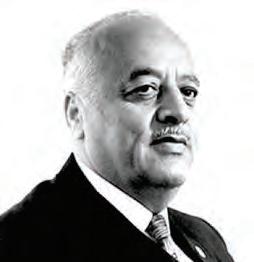
May 29, 1979 — Dayan addresses peace process Foreign Minister Moshe Dayan speaks to the Knesset about the events that culminated in the Israeli-Egyptian peace treaty. He expresses optimism that normalization between the countries will succeed. PJC



By Adam Reinherz | Senior Staff Writer
Since arriving in Pittsburgh on May 4, a delegation of Israelis has rested. That’s the point, Point Breeze resident Sandy Zelekovitz said.
Seated in his landscaped yard beside his wife, Barbara, and the coffee-drinking clan, Zelekovitz told the Chronicle the sevenmember group of wounded Israeli war veterans was given a specific message upon arriving in Pittsburgh: “You won’t go hungry, you won’t go thirsty.”
Such care is contingent on heeding a daily reminder, Zelekovitz said. Each morning, he asks the group, “Did you smile, did you laugh and did you do a mitzvah?”
Hearing Zelekovitz recount the episode and reiterate the questions, the visitors chuckled.
As the Pittsburgher promised, for nearly two weeks, the group was feted and fed. Community members shared their homes and refrigerators. Educators from Community Day School and Hillel Academy of Pittsburgh welcomed the Israelis into their classrooms. New members and longstanding participants in the 412 Friends of Zahal project toasted the veterans following a May 10 Havdalah service and commemoration honoring 50 years of bringing wounded Israeli soldiers to Pittsburgh.

A once impermeable bond between the two countries has shown fissures. Post-Oct. 7, 2023, polling reveals partisan and generational divides.
“Americans’ sympathies with the Israelis continue to decline, largely because of Democrats’ dwindling support for the Israelis in the long-standing conflict with the Palestinians,” Gallup reported.
Within the same March 6 finding, Gallup noted less than half of all U.S. adults (46%), 18 and above, express support for Israel — marking the lowest percentage of support in 25 years.
Similarly, when asked to weigh sympathies by Pew Research Center last year, 14% of respondents ages 18-29 said they were more sympathetic to the Israeli people; 33% said they were more sympathetic to Palestinians.
In March, Brookings Institution reported young Americans differ from their elders when it comes to defining Israeli actions in Gaza since Oct. 7: Whereas 17% of interviewees under age 30 called the actions “genocide,” just 7% of those age 30 did so.
The annual relief effort, which was started by the late Sylvia Robinson, was spurred by an observation.
Robinson noticed that despite being only 5,000 strong, the Jewish community of Geneva, Switzerland, delivered calm to 30 wounded Israeli veterans.
There was no reason, she mentioned in a 1996 recording with the National Council of Jewish Women, that Pittsburgh — which at the time had nearly eight times as many Jews — couldn’t offer the same experience.
Since that pledge, Pittsburghers have continued opening their homes to wounded Israeli veterans. In recent years, the Zelekovitzes have led the charge, finding hosts for the delegates, partnering with Beit Halochem, the Zahal Disabled Veterans Organization, planning a suitable itinerary and ensuring the primary purpose — respite — is achieved.
Two weeks of pampering leaves an imprint, delegation members told the Chronicle.
“I came here mini, now I’m a bus,” Shlomi said while pointing to his stomach.
“Before I came here, I did not know how much love and care there was from the Jewish people in the world. But after being here, I feel like it’s my home and that Barbara and Sandy are like my second parents,” Lior said.
Delegation members’ surnames have been withheld for security purposes.
The group, which spanned more than 30 years in age, consisted of former IDF soldiers, current reservists and security personnel. Several of the individuals mentioned expo sure to terrorist attacks and other traumatic incidents sustained in service; speaking
with the Chronicle for nearly 90 minutes on May 15, the delegation opted to focus on alternative topics. In lieu of addressing politics or the ongoing Israel-Hamas war, the group stressed how meaningful it is to join a 50-year partnership between Pittsburghers and wounded Israeli soldiers.
When enlisting in the delegation, “I didn’t know what to expect,” Shai said.
The first thing he did — as did several other visitors — was Google “Pittsburgh” to learn about the area.
Having spent almost two weeks here,
“it’s an amazing city with amazing people,” he said. “It’s hard for me to receive things from strangers. And I know it’s cliche, but people here have treated me like family from the start.”
Erez, who like most of the group had never before been to the U.S., said the experience reaffirmed his appreciation for bolstering Diaspora-Israel ties.
“This program is very important to saving the community’s relationship between Israel and the U.S. We need the American people,” he said.
Sitting in the Zelekovitzes’ backyard, members of the delegation mentioned their children — some of whom belong to Generation Z, people born between 1997 and 2012. The visitors said they’re aware of shifting attitudes toward Israel, the U.S. and even interpersonal relations.
“It used to be that when you were a kid and you had your opinions about something, politics, anything, you would go and talk to someone about it. You’d see them face-toface,” Avner said. “You bring social media in and now, ‘You’re the devil. You’re the fascist right or you’re a Commie leftist.’”
Given the inability, or even reluctance, of people to physically be together and how easy it is to manipulate messaging “you can see how the divide happened,” he continued. “I lived through such a divide. I saw Brexit happen in front of my eyes and I couldn’t understand why.”

New apps emerge, but social media remains. “We need to learn how to work with it,” Avner said. “How to live with it.”
“It’s like post-traumatic stress disorder,” Shlomi interrupted. “We must live with that.”
The Israeli delegation left Pittsburgh on May 18. Three days earlier, before heading to lunch with several U.S. veterans, the Israelis told the Chronicle that after visiting Pittsburgh they were emboldened to return home.
Zelekovitz said he’s seen how two weeks of care can make a difference.
“We live under a flight path of helicopters,” he said.
The choppers transport patients to nearby hospitals, but on the first day the delegation was here one of the members mentioned how in Israel “everyone looks up because we know they’re coming from Gaza, we know they’re coming from Lebanon,” he said. “Today, when the helicopters flew over, no one looked up. Mission accomplished right?” PJC
Adam Reinherz can be reached at areinherz@pittsburghjewishchronicle.org.
By David Rullo | Senior Staff Writer
Antisemitic flyers were distributed in several local neighborhoods during daylight hours on May 18.
The flyers, attributed to the Goyim Defense League, were enclosed in plastic bags weighed down with corn kernels.
The GDL “is a loose network of individuals connected by their virulent antisemitism,” according to the Anti-Defamation League. “The group includes five or six primary organizers/public figures, dozens of supporters and thousands of online followers.”
Propaganda titled “The Protocols of the Learned Elders of Zion: The Jew’s Plan for World Domination” and “Every single aspect of the Jewish Talmud is Satanic” was left at residences in Squirrel Hill, Shadyside and Peters Township.
Witnesses reported seeing several people in a gold SUV or tan Dodge Durango with their windows open yelling, “Oy vey,” and throwing the bags, according to Shawn Brokos, Jewish Federation of Greater Pittsburgh’s community security director.
The GDL, she said, is known by law enforcement but typically performs this type of flyer distribution under the cover of night.
“What was surprising,” she said, “was how blatant they were this time. It’s almost like they were looking for attention.”
A positive aspect to the daylight timing of the acts, Brokos said, was the abundance

of surveillance cameras that captured the perpetrators as well as their vehicle.
“We’ve shared those will law enforcement who are working very diligently on this,” she said.
Pittsburgh police, Brokos said, have made investigating the flyers a top priority.
The flyers drew immediate condemnation.
Mayor Ed Gainey called the missives “reprehensible” and said they have no place in Pittsburgh.
“We will not stand for such hateful acts meant to intimidate our neighbor,” he wrote on Facebook.
Gainey wrote that his office was working with the Federation and noted that the
Pittsburgh Bureau of Police was investigating the flyers along with the FBI.
His Democratic primary challenger, Allegheny County Controller Corey O’Connor, posted a message on Facebook, as well.
“Despicable antisemitic acts like those taking place in Squirrel Hill today have no place in our city,” O’Connor wrote.
State Rep. Abigail Salisbury wrote that the flyers were intended to “intimidate and terrorize.”
The Rev. Canon Natalie Hall of The Episcopal Church of the Redeemer noted that residents near her church received the flyers.
“Our congregation will not abide these false accusations about and threats against our Jewish neighbors,” she wrote. “We stand as friends, willing to protect those who are threatened.”
The Federation condemned the flyers in a statement posted to its website and on social media.
“This kind of hate has no place in our neighborhoods,” said Laura Cherner, director of the Federation’s community relations council. “Our community is strong, united and we will stand together to oppose these vile actions.”
Brokos urged anyone with information about the incident, including videos from home cameras, to call 911 and report it to the Federation at jewishpgh.org/form/ incident-report. PJC
David Rullo can be reached at drullo@ pittsburghjewishchronicle.org.
By Adam Reinherz | Senior Staff Writer
Ahallmark of Pittsburgh Jewish life is returning for an evening of education, cheesecake and coffee. Complete with speakers and participants representing the breadth of Pittsburgh’s Jewish community, Tikkun Leil Shavuot will occur on June 1 between 10 p.m. and 1 a.m. at the Squirrel Hill branch of the Jewish Community Center of Greater Pittsburgh.
This year’s program, which is sponsored by the Jewish Federation of Greater Pittsburgh, features “exciting new teachers, as well as


the trusted and terrific teachers who have been with us for a number of years,” organizer Rabbi Danny Schiff said. During

the evening’s three-hour span there will be nine speakers who did not present last year as well as five “who have never presented
at Tikkun for us at all.”
The plethora of willing and able presenters is a testament to the “tremendous enthusiasm” held for the program, he continued. “I think that that comes across in the evening. It really has become the centerpiece of Torah learning for the community.”
Shavuot, which begins the sixth day of the Hebrew month of Sivan, falls seven weeks after Passover. Originally deemed a harvest festival, Shavuot is cherished as the day the Torah was given at Mount Sinai.
For nearly 500 years, Jewish people have skipped or delayed bedtime to study sacred writings on Shavuot. The practice, according to My Jewish Learning, was
By Asaf Elia-Shalev | JTA
Families sending their children to yeshivas and other Jewish schools nationwide would be eligible for tuition assistance through a federal tax credit proposed in federal budget legislation.
The proposal — which would create scholarships of up to $5,000 per student — marks the furthest that proponents of school vouchers have ever gotten toward expanding school vouchers nationwide.
The voucher program’s inclusion in Trump’s budget reconciliation bill was hailed as “historic” by Agudath Israel, a national Orthodox Jewish umbrella organization involved in lobbying efforts alongside other school choice advocates. The group brought 200 people to Washington, D.C., last month to press lawmakers on the issue.
“By prioritizing scholarships among the many competing tax policies vying for inclusion, the House leadership demonstrated why school choice is spreading across the



nation,” said Rabbi Avi Schnall, Agudath Israel’s director of federal education affairs. “Parents want to choose the best educational setting for their child.”
The Orthodox magazine Mishpacha recently called the voucher proposal a “financial lifeline” that would “trans form the tuition landscape” for families whose children attend yeshiva and other nonpublic schools.
Twenty states offer some form of tuition assistance for private schools, but most state programs are small. New York, home to the largest number of Jewish students, does not offer vouchers or tuition tax credits at all. A federal program would introduce school vouchers from coast to coast, even in Democratic-leaning states where lawmakers and voters have opposed such arrangements.

The proposal to create a federal school voucher program is tucked into a broader budget bill that seeks to extend President Donald Trump’s 2017 tax cuts and add funding for border security, while cutting from Medicaid and other services.
Republicans on the House Ways and Means

“Only those who do nothing at all make no mistakes.”









Committee voted on Sunday to advance the bill, a key step toward consideration by the full chamber and eventually the Senate, both of which have a Republican majority.
The proposal has advanced over the staunch opposition of dozens of liberal religious groups. Earlier this month, the Union for Reform Judaism, representing American Jewry’s largest denomination, and the National Council of Jewish Women were among the signatories of a letter criticizing the federal school vouchers plan as a threat to religious liberty and a benefit to the wealthy.
“The responsibility for religious education belongs to families, houses of worship, and other religious institutions — we do not need or want the government to be involved,” the letter said.
The program would set aside $5 billion a year for a new kind of tax credit. Private citizens would get $1 off their tax bill for every $1 they donate to special charities known as Scholarship Granting Organizations, or SGOs, capped at 10% of the donor’s income.
The SGOs would grant scholarships of up to $5,000 per child, allowing at least a million students to benefit. Nearly 5 million children in the United States currently attend private schools, according to federal figures. Of those, an estimated 350,000 are Orthodox, Rabbi Chaim Shimon Neuberger, the national director of the advocacy group
Torah Umesorah, told Mishpacha magazine.
Tens of thousands of children also attend non-Orthodox Jewish day schools, according to Prizmah: Center for Jewish Day Schools. Tuition at those schools tends to be much higher than at Orthodox yeshivas.
Families that earn up to 300% of the median income in the area would qualify, which means that all but the wealthiest families can benefit. Agudah is pushing to remove the eligibility requirement entirely.
The availability of scholarships would be driven by donations, giving rise to enthusiasm in the Orthodox world, where internal charitable giving is already high.
“If every family and business in our community, whether or not they have children in our schools, donates the maximum allowed contribution, it would generate enough funds to significantly lower tuition and in some cases, allow students to attend for free,” Rabbi A.D. Motzen, Agudah’s national director of government affairs, told Mishpacha.
The advance of federal school vouchers in Congress is one of several recent developments that are potentially transforming the legal and financial landscape for Orthodox education. New York State, home to a large share of the country’s yeshivas, recently moved to weaken oversight of nonpublic schools. And the Supreme Court is slated to deliver a ruling that could pave the way for the establishment of publicly funded religious charter schools. PJC

SPONSORED CONTENT
This is one in a series of articles about Elder Law by Michael H. Marks., Esq.
Michael H. Marks is an elder law attorney with offices in Squirrel Hill. Send questions to michael@marks-law.com or visit www.marks-law.com.
HOW ARE AN EXECUTOR AND AN ADMINISTRATOR DIFFERENT? An executor is named in a Will, while an administrator is appointed when there is no will (or sometimes when those named in the will cannot serve). The powers and duties are almost the same.
SHOULD I ADD MY ADULT CHILD ON TO MY BANK ACCOUNTS? Assuming your adult child is reliable and responsible, there are two ways to add them to your bank account: either as a Joint Depositor with Right of Survivorship, OR as a mere “In Trust for” beneficiary. Joint depositors means they can access your account for you if needed, and it goes to them automatically when you pass away. If it’s established that way more than a year before you die, they only have to pay inheritance tax (at 4½%) on the fractional share they’re inheriting from you. BUT If they die before you, you’ll pay inheritance tax on inheriting BACK some of your own money. If you want to undo the arrangement, you can just take your money out and put it into a new account without their name on it
An “In Trust For “ Beneficiary arrangement means they can’t touch the money during your lifetime, but it goes to them automatically when you die, and it’s all taxable, not just a part of it.
SHOULD I ADD MY ADULT CHILD ON TO THE DEED TO MY HOUSE? The big difference in this instance, compared to adding them on to your bank account, is that if you change your mind, you
can’t just take them off the deed by acting alone, unilaterally. They would need to agree and sign, too.
The advantages are: if the deed is set up properly, when you die, the house will go to them automatically, without probate; if more than a year has gone by, they only have to pay inheritance tax on the fractional share they’re inheriting from you; and it can tend to help protect the value of your home against the cost of your own long-term care (especially for a single person like a widow).
The disadvantages are that now you added someone else as an owner on your home along with you. If your child dies before you, you’re going to pay inheritance tax on inheriting BACK a share of your own home. Making a gift of ownership of your home can also interfere with your eligibility for Medicaid for long-term care. The disadvantage for your child is that there is no step up in basis. When the house is sold the resulting federal capital gains tax could outweigh the savings from avoiding probate.
AFTER MY GRANDMA DIED IN THE NURSING HOME, THE COMMONWEALTH CLAIMED THE PROPERTY SHE LEFT BEHIND. CAN THEY DO THAT? Yes. When someone who died was in a nursing home with Medicaid paying for them, under the Medicaid “Estate Recovery” program, Pennsylvania can claim reimbursement for Medicaid long-term care costs advanced, if there is no beneficiary or coowner on the property. BUT IF there is a beneficiary or co-owner on it, it’s generally safe for you.
I LIVE IN A HOUSE I INHERITED FROM MY AUNT BUT I NEVER CHANGED IT TO BECOME THE OWNER OF RECORD. WHAT DO I NEED TO DO? Ordinarily you would need to open a probate estate and have someone appointed as Executor or Administrator deed the house to you (and also do all
the other required paperwork and tax returns). If a longer period of time has gone by, there may be a shortcut method, but you will not acquire good and clear and marketable title right away, as you would if you did the full-scale probate paperwork.
IF I DIE WITHOUT A WILL, WILL THE STATE OF PENNSYLVANIA TAKE MY PROPERTY? No, if you die without a will, or “intestate,” your property goes to your “heirs” under Pennsylvania law – your closest family relatives, but if you have no family relatives, your estate could be forfeit or “escheat” to the Commonwealth. (The lesson? Make your own choices! Otherwise it’s like letting some clowns in Harrisburg decide who will inherit from you.)
MY DAD LEFT ME A CAR OWNED, TITLED AND REGISTERED IN HIS NAME ONLY. DO I HAVE TO GO THROUGH THE WHOLE PROBATE ESTATE PROCEDURE JUST TO GET TITLE TO THE CAR? No. PennDOT doesn’t make too many things easy in life, but you can use a PennDOT

form to change title to a car owned by the decedent only, without opening probate. Even though it sounds exactly like a probate asset – owned, titled, and registered to the person who died only – there are exceptions, such as this one.
MY NO GOOD SISTER WHO LIVED IN MOM’S HOUSE WHEN SHE DIED, WITHOUT PAYING RENT, IS STILL THERE. CAN SHE STAY? It’s complicated, but yes, under PA law, when an heir or a beneficiary to whom real estate is specifically bequeathed lived in the home with the permission of the owner at the time they died, they have some (not clearly defined) right to stay, and generally without paying rent. Court cases and judges in the past have said that a reasonable time to stay might be from six months up to even multiple years, but it’s determined at the discretion of the court.
At Marks Elder Law, we help people every day with issues like these. I invite your questions and feedback. Please let me know how I can help.


By Lydia Kacala | Contributing Writer
The estate planning process can be difficult for a many reasons. It can be emotionally taxing to think about what happens after your death, and creating a plan that works for you and ensures your loved ones are protected requires a lot of time and effort.
However, going through the process can prevent those you wish to inherit your assets, whatever they may be, from going through the probate process. This is true for leaving behind a house for your loved ones.

According to Adam Fried, founder and president of The Law Offices of Adam M. Fried, LLC in Beachwood, Ohio, and Arthur Gibbs, partner and national co-chair in the trust and estate practice at Hahn Loeser & Parks LLP in Cleveland, houses that are not designated to a beneficiary at the time of the owners death must go through the probate process.
“If I have a home that’s titled in my own name and I pass without having designated a beneficiary or transferred the title to a trust for the purpose of distributions, then the asset would need to be distributed through a probate administration,” Fried said.
There are a number of ways to protect the
house, and by extension your loved ones, from going through probate, he said. For those who own a house with their spouse, survivorship features can be built into the deed to the property.
“For instance, if I own it jointly with rights to survivorship with my spouse, or another party, on the death of one of the owners, because each owner would have an undivided interest, the survivor would simply prepare an appropriate document with the (county) recorder’s office, have that affidavit of survivor along with a death certificate, and the interest of the deceased would pass
to the survivor tenant,” Fried said.
However, if two or more people own a home together and don’t have survivorship features built into the deed of the house, upon the death of one of the owners, the interest would have to go through the probate process, he noted.
Transfer-on-death designation affidavits also prevent a house from going through the probate process after a person’s death, Gibbs said. Those who have a relatively straightforward estate plan may choose to move forward with this option, allowing the owner to sign the document and transfer the house




upon their death without creating a trust.
However, those with estate plans that are more complex, such as dealing with a significant amount of wealth, adult children with disabilities, or minor children, might choose to create a trust, he noted.
“If they (create a trust), we can have them sign a deed transferring the real estate into their trust, so that their trust owns it and upon their death, we avoid probate as well that way,” Gibbs said. “And then, the real estate is dealt with in accordance with the terms of the trust.”
While Gibbs recommends clients move forward with one of the options to prevent a house from going through probate, he acknowledges that no two estate plans are the same.
“I use a couple cliches,” Gibbs said. “It’s never a one-size-fits-all, and, I often use another analogy, that I tell folks that estate plans are a bit like snowflakes in that they all look the same at a distance, but once you bring them under the microscope and start examining them, every estate plan is different. And so, you really need to think through these issues and make sure that you have the approach that works best for your own situation.” PJC
Lydia Kacala writes for the Cleveland Jewish News, where this first appeared.
Vandalism:
Continued from page 1
During the hearing, Assistant U.S. Attorney Carolyn Bloch recounted the evidence that would have been used in a trial against Lubit. She noted that the words “Jews 4 Palestine” and an inverted red triangle — a symbol used by Hamas to identify targets — were painted on the Chabad of Squirrel Hill building, and “Funds genocide, Jews Hate Zionists” was painted on a Jewish Federation of Greater Pittsburgh sign.
After recounting the charges, the judge asked Lubit if she committed each of the counts, to which the defendant replied, “I did.”
Following the hearing, the Federation released a statement saying it welcomed the guilty plea, calling it a “significant step toward justice,” but added that it remains “mindful that both Hamad and Collins both have charges remaining.”
The Federation said it was grateful for the work of the FBI, Bureau of Alcohol, Tobacco,
O'Connor:
Continued from page 1
“You showed this whole city what it means to have a city for all,” he said. “You have young, old, Black, white, Latino, Palestinian and Jew, Christian and Islamist, right here in this room. I’m grateful to you because you showed how to build bridges of love.”
He urged his supporters to be grateful for the progress he said was made during his term.
“It would’ve been easy for me to bow down to power,” he said, “but it was more exhilarating to fight them for you.”
Pittsburgh’s first Black mayor said his 2021 election “didn’t put a crack in the glass ceiling”; instead, he said, “we shattered it.”
In addition to selecting Democratic and Republican candidates for mayor, Pittsburghers also voted in favor of two referendums meant to blunt efforts of groups like Not On Our Dime Pittsburgh from introducing referendums calling for the city to boycott Israel.
The first referendum question asked voters to approve a supplement to the city’s Home Rule Charter that would prohibit discrimination based on “race, religion, ancestry, sex, sexual orientation, age, gender identity or expression, disability, place of birth, national origin or association or affiliation with any nation or foreign state in conducting business with the city.”
The second question asked voters if a new
Firearms and Explosives, the Pittsburgh Bureau of Police, the Department of Justice and all law enforcement partners who acted swiftly “to investigate and pursue justice.
with our law enforcement partners. They meticulously investigated the actions of Hamad and Lubit and left no stone unturned, unearthing a pattern of antisemitism that
The Federation said it was grateful for the work of the FBI, Bureau of Alcohol, Tobacco, Firearms and Explosives, the Pittsburgh Bureau of Police, the Department of Justice and all law enforcement partners who acted swiftly “to investigate and pursue justice.”
Their work continues to play a critical role in ensuring the safety and security of our city.”
Shawn Brokos, Federation’s community security director, echoed that sentiment, noting the “incredible collaboration we have
was escalating toward violence.”
Chabad of Squirrel Hill Rabbi Yisroel Altein said that he, too, wanted to thank the authorities for their work.
The $5,000 restitution Chabad will receive,
Altein said, is necessary because while the city did some initial cleaning, completely removing the graffiti and properly restoring the wall required a more extensive and costly procedure.
He said he was glad Lubit took responsibility for her actions.
“Hopefully, this can be the beginning of a process of her finding the proper path in her Jewish roots,” he said.
Altein called the charges in the superseding indictment “concerning” and said he was pleased to hear that Hamad would remain in prison pending his trial.
He noted that with the arrest of Collins a pattern was emerging.
“We see these same players protesting and supporting Hamas throughout the city,” he said. “Hopefully we can now have a full picture of everyone involved.”
Trial dates for Hamad and Collins have not been set. PJC
David Rullo can be reached at drullo@ pittsburghjewishchronicle.org.
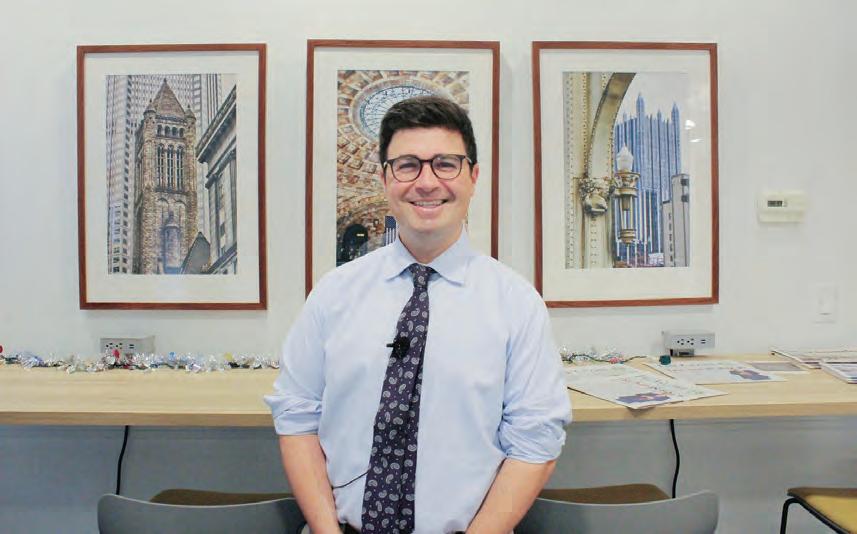
a non-partisan organization that operates to protect the rights and well-being of Jews in the United States, posted on Facebook that it was “celebrating big primary wins across Pittsburgh. Thank you to everyone who contributed, volunteered and voted!”
State Rep. Abigail Salisbury, who endorsed O’Connor during the campaign, congratulated him on winning the primary and called for unity now that the race is over.
“Everyone who disagrees with a Jew is not an antisemite, just like everyone who disagrees with a Black person is not a racist,” she wrote on Facebook. “Everyone who disagrees with a Democrat is not a MAGA. I hope that we all, myself included, try to focus less on the drama and fighting and more on the work of building a better place for everyone. Let’s speak our truth but do the work too.”
Pittsburgh City Councilmember Barb Warwick, a Gainey supporter, thanked the mayor on Facebook, saying it had been an honor to fight with him for a “kinder, more equitable city.”
–COREY O’CONNOR
section should be added to the Home Rule Charter prohibiting the amendment process “to add duties or obligations beyond the lawful scope of the city’s authority.”
Neither Bryan Neft nor Ilan Zur — two Jewish judicial candidates — were elected to the Allegheny Court of Common Pleas. Following the election, Beacon Coalition,

“It wasn’t our night,” she wrote. “But tomorrow we get up and keep doing the work to protect and uplift our most vulnerable residents and build a Pittsburgh for all.”
Pennsylvania’s general election is Tuesday, Nov. 4. PJC
David Rullo can be reached at drullo@ pittsburghjewishchronicle.org.





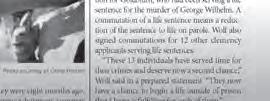


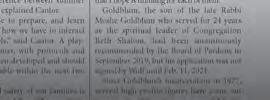

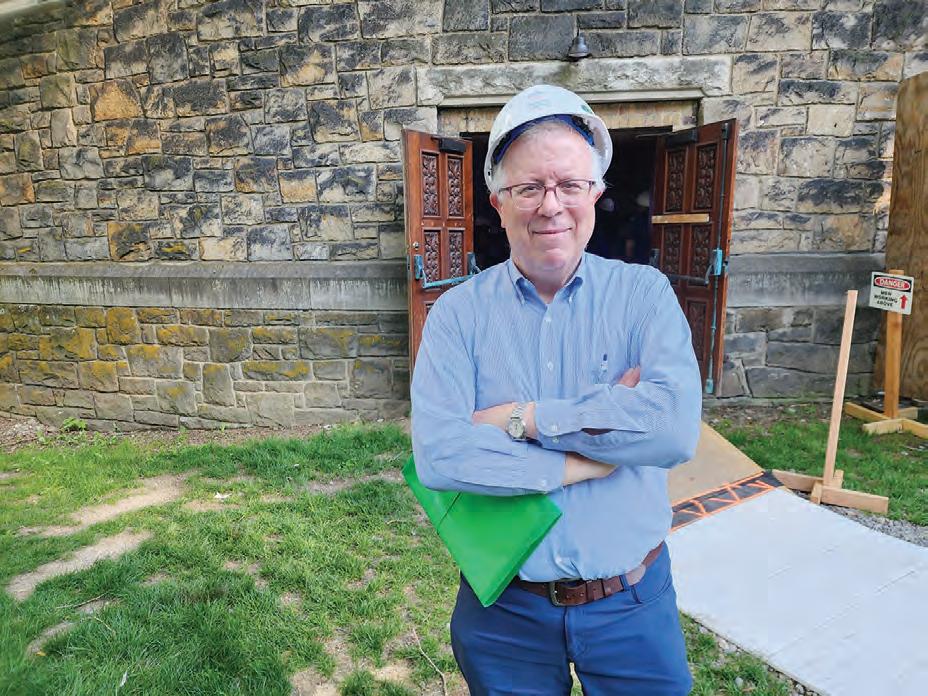
Continued from page 2
State Sen. Jay Costa, who was honored during the event, praised The Rotunda as offering residents a means to connect to the past and craft a promising future.
“The diversity of space that will be here and available to folks is truly unique,” he said. “That’s what I like about it. It’ll be a great place for a lot of people for a lot of different reasons.”
Costa said he’s committed to seeing that resources, both from the state and private entities, continue supporting the project.
Continued from page 7
first recorded by Safed mystics, including Rabbi Isaac Luria and Rabbi Joseph Karo. Pittsburgh’s June 1 program seeks to maintain the nighttime Jewish learning practice by offering three one-hour slots featuring a diversity of topics and teachers.
Among the eight presenters treating Pittsburghers to new insights at 10 p.m. are Cantor Laura Berman and Rabbi Sam Weinberg. Whereas Berman’s class is titled, “Are You a Good Witch or a Bad Witch? — Samuel & the Witch of Endor,” Weinberg is covering the story of Shavuot and its lessons for combatting the “Corrosive Effects of Social Media.”
One hour later, Rabbi Seth Adelson is inviting interested parties to reread “Classic
In March, The Rotunda received a $675,000 grant from the Allegheny Foundation, according to Bloomfield-Garfield.
Nearly $10 million is needed to restore The Rotunda; about $1.6 million has been raised, according to Swartz.
“We’re still in the infancy of our fundraising stage for the project,” he said. “If there’s anybody who would like to become a major contributor, and would like to put their name on the building at some point in time, we’re very open to that conversation.”
As party-goers spent the night toasting a bright future, several attendees addressed the past.
“This is a surreal experience,” Squirrel Hill resident Flora Lee Katz said.
Zionist Texts Post-October 7,” while Rabbi Hindy Finman is encouraging people to explore today’s polarization by finding respectful ways to disagree “with the people we love.”

The nonagenarian, who was confirmed at B’nai Israel and celebrated her children’s bar and bat mitzvahs at the synagogue, hadn’t entered the building since 1995.
Neither had Fox Chapel resident Betty Rich, 57.
Speaking with the Chronicle, Rich recalled attending services at B’nai Israel every Saturday for nearly 20 years.
“I sang with my grandfather for 15 of them,” she said.
Rich’s grandfather, Mordecai G. Heiser, was B’nai Israel’s cantor from 1942 until his death in 1989.
Pointing to an abandoned choir loft, Rich remarked, “I always was short and I had to stand on a box for people to see me.”
“Thoroughbred Racing & Violent Sports: A Torah Ethics Discussion.”
Along with the teachers mentioned are 16 presenters ranging in age, background and religious affiliation.
Rich spent Thursday night reminiscing with former synagogue members. Several attendees recalled sliding down a sloping hallway leading from the sanctuary. Other people described bygone kiddushes, programs and family celebrations. A few people stopped Rich to say they remembered when she and her grandfather sang on Shabbat.
Looking at the building, Rich told the Chronicle, “This is my connection to my grandfather. For it to have a new life is amazing. I’m excited to see what it will become.” PJC
Adam Reinherz can be reached at areinherz@pittsburghjewishchronicle.org.
Schiff, the Federation’s H. Arnold and Adrien B. Gefsky Community Scholar, expects between 400-450 people to attend the educational program.
Studying together in person on the holiday offers a richness virtual learning lacks, he said. “The opportunity to be in the same space as people from across the Jewish spectrum doesn’t come at any other time of the year.”
Rounding out the final 12 to 12:50 a.m. slot are speakers including rabbinical student Maddie Herrup, who will discuss how to transform “our fear into awe through the revelation at Mount Sinai,” and Rabbi Levi Langer, whose class is titled,
The diversity is by design, Schiff said. “I want to ensure that in every hour of the three hours that there is someone who is presenting that represents something different, so that people have a really compelling range of choices.”
With no need for registration, Schiff only has one request for Pittsburghers: “Come. It’s a once-a-year opportunity to really take one’s Jewish identity seriously in terms of the learning aspect, and to be together with the Jewish community in its broader sense.” PJC
Adam Reinherz can be reached at areinherz@pittsburghjewishchronicle.org.

Anti-Israel rhetoric is fueling an alarmingly powerful new wave of antisemitism on the right
Something in President Donald Trump’s politics when it comes to Israel has clearly shifted.
He’s cut Israel out of hostage negotiations and just toured the Middle East without visiting the Jewish state. Those who hope this is just another instance of Trump’s trademark rapid swerves, or a way to try to keep Israeli Prime Minister Benjamin Netanyahu in check, are wrong. And while worry has begun to spread among Trump’s pro-Israel supporters over the alteration, they’re not worried enough.
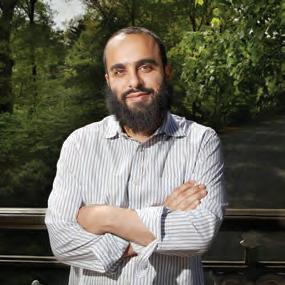
equal airtime to people like pro-Israel white nationalist Douglas Murray. Carlson is far more purposeful and calculated in his approach — and perhaps even more influential.
He has almost 14 million followers across various platforms. He has long held as much sway with Trump as almost any outside adviser. It is impossible to overstate the power of just this one voice alone: He is, effectively, the main reason JD Vance is vice president.
influencers has begun to build anti-Israel sentiment — both within the Trump administration and within some of the movements that helped vote Trump into office.
Starting around the time that episode aired, Owens herself began to embrace anti-Israel rhetoric, building on a long history of antisemitism. With even more followers than Carlson — 15 million — Owens latched onto the Gaza war to launder her conspiracy theories about Jews through outrage at Israel. She stood by — and still stands by —
Carlson, Owens and Rogan have in the new media landscape — an influence that is only growing.
The force of that shift is clear within the Trump administration: As The Washington Post reported, the president’s inner circle has deliberately sidelined pro-Israel lobbying groups and neoconservative hawks, perhaps the clearest evidence of a deeper, structural realignment at the highest levels of the right.
Because Trump’s shifting attitude is representative of a change that has been brewing on the American political right for a decade — one that affects not only Israel, but American Jews as well.
The far-right grassroots movements that propelled Trump to power are becoming increasingly anti-Israel, and, in doing so, moving the needle for the mainstream right, as well. And as more prominent figures on the far right edge from anti-Israel sentiment into outright antisemitism, the entire Republican and right-wing ecosystem is beginning to turn against Israel and Jews.
Three figures exemplify this change: Joe Rogan, Tucker Carlson and Candace Owens. Rogan, a podcaster with almost 40 million followers across his platforms, has hosted guests including Holocaust denier Darryl Cooper, who has said Churchill was the “chief villain” of World War II; Andrew Tate, the alleged sex trafficker who complained about how “speaking out against the Jews” is forbidden; and Ian Carroll, an influencer who regularly spreads anti-Israel conspiracy theories combined with antisemitism. Among Carroll’s favorite (totally false) claims: that the Mossad controls the CIA, and that the “Zionist Mafia … controls the US and global politics.”
But Rogan’s flirtations with antisemitic rhetoric aren’t methodical. He often frames his podcasts as “just asking questions,” and can point to the fact that he at least gives
The shifts we’re seeing on the right are a direct result of the influence people like Carlson, Owens and Rogan have in the new media landscape — an influence that is only growing.
Unlike Rogan, Carlson spent years spreading antisemitic conspiracy theories before becoming more openly anti-Israel. He is credited by many with having used his former platform on Fox News to make once-fringe conspiracy theories, like the great replacement theory, mainstream. And even there, he regularly featured antisemitic guests.
This laid the groundwork for his current anti-Israel tone, which he began developing almost immediately after getting fired from Fox News in April 2023. Now, on his own independent podcast, his antisemitic conspiracy theories have fused with antiIsrael and nativist sentiment.
One of his podcast guests has claimed that the Rothschilds created the theology behind Christian Zionism. Only days ago, he implied Israel is an enemy of the United States due to its push for a military conflict with Iran.
And, during an episode featuring Owens just a month after the Oct. 7, 2023, Hamas attack on Israel, Carlson himself claimed that Zionist Jews were responsible for causing a “white genocide.”
The link between Carlson and Owens helps show how a network of right-wing
Kanye West, known as Ye, as he descended into extreme antisemitism and anti-Black racism. When her YouTube account was suspended after an August 2024 interview with Ye in which he claimed “Jewish people control the media,” she blamed “Zionists” for her channel being shut down.
She, like Rogan, has hosted a number of antisemitic conspiracy theorists — including, yes, Ian Carroll, who is slated to take over her massively popular platform while she is off for parental leave.
The impact of voices like Rogan’s, Carlson’s and Owens’ on perceptions of Israel on the right has been dramatic. Unfavorable views of Israel among Republicans have leaped from 27% to 37% since 2022. Even more astonishingly, half of young Republicans now have unfavorable views of Israel, an increase of more than 40% since 2022.
This is not a coincidence. Half of Americans get much if not all of their news from social media. More than a quarter get it from podcasts. Of the young people who consume news from influencers, 65% say those voices shaped their understanding of current events.
The shifts we’re seeing on the right are a direct result of the influence people like
The change in Trump’s behavior toward Israel, then, is almost certainly not just about his moods, impulses, or transactional view of the world, although they of course always factor in. Instead, it’s about the new intersection of anti-Israel sentiment and antisemitism on the right. Conspiracy theories that had already proliferated on the right before the Israel-Hamas war — the great replacement theory, QAnon, anti-vaccine beliefs, concerns about a so-called “deep state” — all are, at their heart, antisemitic, and they all can easily be manipulated to include Israel.
Worst of all, what we are seeing is really only the beginning.
As I have written in the past, social media platforms like X (formerly Twitter) have been used by the far right to appeal to progressives by criticizing Israel, while actually spreading far-right antisemitic conspiracy theories. In other words, those on the far right who wed anti-Israel sentiment with antisemitism are making savvy attempts to bring unlikely new members into the fold, and succeeding. And social media dialogue is, accordingly, becoming increasingly extreme, with calls for violence against Jews common.
All of this to say: Trump may end up reversing his views, but nothing will change the reality on the ground. Anti-Israel sentiment on the right may be opening the door to the most dangerous antisemitism this country has ever faced. PJC
Elad Nehorai is the co-founder of Hevria and one of the leaders of Torah Trumps Hate. His writing can be found in the Daily Beast, Huffington Post, the Guardian and other outlets. This story originally appeared in the Forward. To get the Forward’s free email newsletters delivered to your inbox, go to forward.com/newsletter-signup.
Sen. John Fetterman must have health concerns — since he supports Israel
During John Fetterman’s campaign for Senate, the morally indignant harrumphs filled the media at the mere intimation that the candidate’s health should be an issue. Now just midway into

his first term, the very handwringers who scolded Pennsylvanians for legitimate concerns about competency are not only speaking out of the exact opposite sides of their mouths, but doing so in such a way as to offer grievous insult both to the senator and to the commonwealth’s voters of both parties.
The press is filled with what Democrat Sen. Kyrsten Sinema of Arizona calls “despicable hit pieces” about Fetterman and is surprised that “anyone would publish such
obvious vendettas.” If wrong, she certainly can’t be faulted in her estimation, as what’s been dredged up and thrown at her colleague does indeed seem scurrilous and backstabbing on its face.
According to those supposedly in the know and willing to prattle on to news fonts, Fetterman is given to outbursts, slamming desks, picking arguments, shouting and repeating himself. He’s taken to skipping medical appointments and engaging in “reckless” behavior like texting while
driving, and good heavens, at high speeds as well. The liberal media and fellow Democrats who were blind to the obviously age-challenged president stumbling about in plain view in front of them for four years now see the light and have unaccountably yet instantly developed acute diagnostic skills — concerning Fetterman’s health, that is. And their thoughtful concern heightens coincidentally with each occasion on which
Last week, the Chronicle asked its readers in an online poll the following question:
“Have you become concerned about the Trump-Netanyahu relationship?” Of the 264 people who responded, 68% said yes, 24% said no and 8% said they weren’t sure. Comments were submitted by 88 people. A few follow.
I don’t really trust either one of them.
Yes, one’s an idiot and one is smart and cunning. Sadly, they have the same powerhungry objective.
I wish that they were as close as they had seemed to be previously. I was concerned that they were too similar, but I now find Trump to be way more reprehensible and a stain on his respective country. At the end of the day, I am more worried about the Trump-Qatar relationship.
I’ve been concerned all along. Both men seem unfit for office without a wellformed, articulated or viable path forward for the welfare of their nation-states and constituencies.
No visit to Israel but meeting with Syria?! Where is pressure to get remaining hostages? Where is pressure on Qatar? Trump is proving that he only cares about
Nabhan:
Continued from page 14
the senator speaks out in favor of normalcy rather than fringe lunacy.
When it was chic to rip down posters of Jews kidnapped by Hamas, and Fetterman dared make it clear he stood with Israel, plain and simple and with no reservations, this was the first indication for many keffiyehwearing activists that there may be a mental health relapse at hand. Months later the senator’s confirmation of even a couple of the current president’s cabinet picks raised concerns further.
himself. Sadly, Jews that support him are going to find out that he doesn’t really give a damn about the Jews.
I am glad that Trump is distancing himself from Netanyahu.
I’m not concerned, because it’s apparent that Trump has tired of Bibi and his rhetoric. Bibi is making Israel look bad
and it looks like Trump doesn’t want to be tied to him.
Only in the sense that Trump is a fickle ally and at some point he’s going to throw Israel under the bus, just like he did to Ukraine.
I haven’t “become” concerned because I was always concerned about Trump’s disregard for Israel.
Trump is solidly with Israel and Prime Minister Netanyahu.
I am not concerned as President Trump is being himself. He is a deal maker. The press is not very accurate or honest.
Actions speak much louder than words. Thus far Trump remains our friend. Surely a Jew should have been far more concerned about the Netanyahu relationship with Biden/Obama.
They are both criminals: one convicted, and one who should be convicted.
Though President Trump storms and challenges the world, he does and will work for the benefit of Israel. He does know that Hamas cannot remain as a significant power,
So it’s now becoming clear to one and all — at least those tribalists who demand that no legislator back any common sense facet of normalcy in governance while their opposition party is in power — that Fetterman’s health is back to being a potentially huge problem.
But then Fetterman voted with a few other Democrats to pass the Laken Riley Act to protect Americans from illegals charged with crimes. He followed that up with having the temerity to support a bill to impose sanctions on the International Criminal Court for it absurdly bringing war crimes charges against the prime minister of Israel. So it’s now becoming clear to one and all — at least those tribalists who demand that no legislator back any common sense facet of normalcy in governance while their opposition party is in power — that Fetterman’s health is back to being a potentially huge problem. There is, however, another possibility, and one which might instantly grant Fetterman a clean bill of health, the same course Sen. Joe Manchin from neighboring West Virginia took. If Fetterman
Holocaust stories matter — thanks for sharing Oscar Singer’s
When I worked at the Jewish Community Center I got to know several Holocaust survivors. With the exception of one who talked about his war experiences (in Hebrew, which he remembered from his cheder lessons back in 1920s Poland) I never knew their life stories. Thanks to “Holocaust survivor Oscar Singer turns 100 with plates of food and plenty of stories” (May 9) I now know the story of Oscar Singer. I used to see him every day at the JCC (I envied his amazing workout ethic. He rarely missed his daily workout.)
The story of each survivor is a story of tragedy and triumph. Thank you, Lee Fischbach, for encouraging your dad to tell his story. My grandfather was not caught up in the Holocaust because he fortunately left Poland in 1910. I wish I knew his story. I got to live my life because of him.
I volunteer at the JCC senior lunch. Oscar is a regular customer. Oscar the retired chef now leaves the cooking to others.
Mitchell Nyer Pittsburgh
but he looks at different ways of reducing its effectiveness.
Trump has little understanding of the situation in Gaza. Every one of those Hamas terrorists has to be hunted down and eliminated. The Palestinians are being used as shields by their own kind.
I am actually concerned about Trump’s relationship with Israel, whether or not Netanyahu is in power. Trump cut Israel out of the deal with the Houthis, he cut Israel out when getting a hostage released, and he unilaterally declared that sanctions on Syria would be lifted, without having negotiated guarantees. He states that he will accept a plane from Qatar, which will invite influence.
This is a horrifying, dangerous partnership between two of the most threatening authoritarian leaders of our time. PJC
— Compiled
by
Toby Tabachnick
Chronicle weekly poll question: Are you pleased with the results of the May 20 primary election? Go to pittsburgh jewishchronicle.org to respond. PJC
were to separate himself from the party currently brandishing the long knives in his direction, were he to register as independent or Republican, it’s almost a surety that his health woes would quickly recede into the background. The faux-“progressive” faction having taken over the once-sane Democrat party would instantly shift their attention from concerning themselves with his well-being to figuring out which of the contemptible figures from authoritarian history — Franco, Pinochet, Mussolini, etc. — with whom he might be conflated.
And that’s as surefire a cure as can be offered at UPMC or anywhere else. PJC
David Nabhan is a Pittsburgher who writes a science column for both The Times of Israel and Newsmax.
We invite you to submit letters for publication. Letters must include name, address and daytime phone number; addresses and phone numbers will not be published. Letters may not exceed 500 words and may be edited for length and clarity; they cannot be returned. Send letters to: letters@pittsburghjewishchronicle.org or Pittsburgh Jewish Chronicle 5915 Beacon St., 5th Floor
Pittsburgh, PA 15217
We regret that owing to the volume of correspondence, we cannot reply to every letter.
By Jessica Grann | Special to the Chronicle
This is the Swiss steak recipe I grew up with and it’s still a family favorite. The ingredients are basic yet they combine to make such a delicious dinner.
I especially love this with rice to sop up the sauce and flavor. I usually steam rice but I prefer this dish with boiled white rice, or what I refer to as “sticky” rice.
One pound of meat will serve two or three people, but the amounts in this recipe can easily be doubled or tripled if you’re serving a large crowd.
Preparation takes only about 20 minutes but the dish needs an hour on the stovetop to cook.
Ingredients:
1 pound pepper steak
¼ cup all-purpose flour
4-5 tablespoons oil
1 rounded cup diced onion (about ½ of a large onion)
1 rounded cup diced celery
1 14.5-ounce can diced tomatoes
1 can of water
Salt and black pepper to taste
1 bay leaf, optional
If you’re serving this dish with rice, start the rice first. Rice takes about 20 minutes to

cook and the meat takes about 20 minutes to prepare; the rice will be finished before you put the Swiss steak on for an hour-long slow simmer, so you’ll be able to walk away from the kitchen without much concern.
Pepper steak is the best type of meat for this recipe. It’s a cheaper cut, but it needs to be pounded well on each side before cooking. It’s imperative to use a meat pounding mallet. Sprinkle each side of the meat lightly with salt and black pepper.
Put the flour in a wide flat dish and press each side of the meat into the flour. It should be lightly covered in flour; if ¼ cup of flour doesn’t do it,
It’s easiest to cook this recipe in a stainless steel, wide sauté pan with a tight-fitting lid. Add your choice of a neutral, high smoke point oil to a warm pan over medium heat. Allow the oil to heat until it’s shimmering, then brown each piece of meat for 2-3 minutes on each side; typically you will need to fry two batches per pound. When the meat is browned, set it aside into another dish.
There will be brown bits of flour sticking to the bottom of the pan. Add an extra tablespoon of oil to the pan and stir in the onions. Use a wooden spoon to scrape the bottom of
the pan and stir all of the browned bits of flour and meat into the onions.
Cook for 3-4 minutes, then add the celery to the onions.
Stir well and sauté for 3-4 minutes.
Add 1 can of diced tomatoes. If there is any brown flour still on the bottom of the pan, the acidity of the tomatoes should release it so that it is mixed with the sauce. It’s just a small amount of flour, but it contributes to the texture of the sauce, which is on the light side.
Fill the empty tomato can with water and add to the pan.
Place the meat in a single layer into the vegetables.
Raise the heat on the burner so that it comes to a gentle boil.
Add the bay leaf if using.
Sprinkle with salt and pepper, place the lid on the pan and reduce the heat to simmer for an hour.
The meat should be fork-tender when it’s ready to serve. If it feels tough, cook it for another 15 minutes, adding a little water to the pan if needed.
Remove from the heat and let rest for 5 minutes before serving.
This rewarms well so you can make it earlier in the day if you feel like getting dinner preparation out of the way.
Enjoy and bless your hands! PJC
Jessica Grann is a home chef living in Pittsburgh.









Juniper Village is the area’s most welcoming Personal Care and Memory Support community… just minutes from Regent Square and Squirrel Hill
Juniper Village at Forest Hills provides everything you’ll need to enjoy an active and healthy lifestyle at an affordable price without the expense of a large buy-in fee. You’ll find us comparable to an apartment complex with all the privacy you desire. Here at Juniper, we’ll pamper you with conveniences such as delicious meals, housekeeping, entertainment, transportation, care services, and most of all friendships.



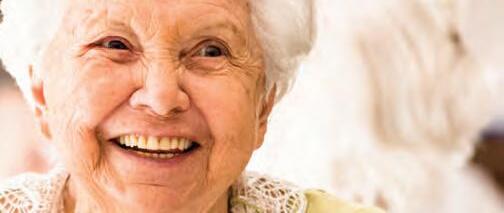



Order custom cakes, party platters & more for your graduation gathering
SCAN FOR CAKE ORDERING





























Reva Pomerantz and Lucas Heller, and Ezra Mirvish and Jill Millstone are thrilled to announce that Eliana will become a bat mitzvah on May 24, 2025, at Congregation Beth Shalom. She is a vibrant member of Community Day School, where she has attended school since kindergarten. Always staying busy, Eliana loves to play basketball, swim and run. She is known for her quick wit and ease at making friends. She is an avid skier and excels at piano. Her younger siblings all look up to her and are very proud of her. Congratulations, Eliana!
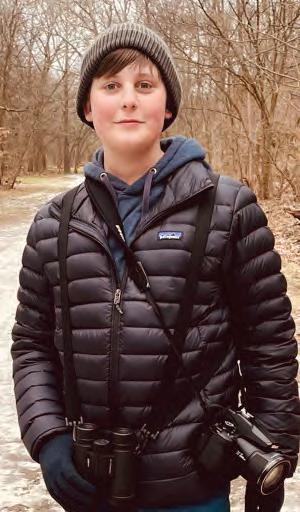
Ezra David White , son of Charlie White and Stephanie Ford, will become a bar mitzvah at Congregation Dor Hadash on Saturday, May 24, 2025. Ezra is the grandson of Ann and Bill Ford, and Barbara White and the late Michael White. He is in the seventh grade at Winchester Thurston School. Ezra is a keen observer of the natural world and an avid bird-watcher; for his bar mitzvah project, he will work with the Three Rivers Birding Club to establish a family-friendly birding walk to encourage other young birders.

Eli Ziff, son of Ella Zeilinger Ziff and the late Dan Ziff, and the stepson of Daniel Berkowitz, proposed to Marlee , daughter of Brooke Lertzman Weinberg, stepdaughter of Auren Weinberg of Palm Beach Gardens, Florida, and Michael Zeitz of Cherry Hill, New Jersey. Eli and Marlee met in 2018 when they were attending Indiana University, Bloomington. Eli and Marlee then both received master’s degrees from Temple University. Eli specializes in talent development at USI Insurance Services and Marlee is an elementary school psychologist. They share a love of Big Ten sports, of course, travel, exploring new places in Philly, where they call home, the beach, and the love and support of a close family. Eli surprised Marlee with a proposal on her favorite beach in Margate City, New Jersey. We are looking forward to all of the celebrations to come! PJC


ARabbi Yisroel Altein
Parshat Behar-Bechukotai Leviticus 25:1 – 27:34
wealthy man once passed a construction site and noticed three workers laying bricks. Curious, he approached the first and asked, “What are you doing?”
“I’m laying bricks,” the man answered, without looking up.
The second man replied, “I’m building a wall.”
But the third paused, smiled and said, “I’m building a house of worship — a place where people will gather to connect to something higher.”
Three men, same job — but only one knew his purpose.
Let
This story isn’t just about bricklayers. It’s about all of us. We may be building families, businesses, communities or careers — but if we forget what we’re ultimately building, we risk becoming just laborers, not visionaries.
In the beginning of this week’s Parshat the Torah outlines the agricultural cycle in the Land of Israel:
“When you come into the land which I give you, the land shall rest a Sabbath to G-d. Six years you shall sow your field … ”
The order is strange. We’d expect the Torah to first describe six years of labor, followed by the seventh year of rest — the Sabbatical year, or Shemita. But instead, the Torah opens with rest: “The land shall rest a Sabbath to G-d,” and only then speaks of six years of work. It almost sounds as if the very first thing the people did upon entering the Land of Israel was observe Shemita — which we know wasn’t the case. In reality, the first Shemita year didn’t begin until after the six years of work. So why present it as if rest came before work?
The Lubavitcher Rebbe explains that the Torah here is teaching us a life lesson.

The Shemita year represents more than agricultural practice — it reflects our entire approach to life. The Torah places Shemita first to remind us: Purpose comes before productivity.
We are not defined by our work. We are not here just to plant and harvest, to build and acquire. First and foremost, we are souls — sent into this world to create a dwelling place for the Divine.
In Shemita, a Jewish farmer would stop tilling the soil and instead turn inward — toward G-d, toward Torah, toward trust. The land, like our lives, was to be returned to its true Owner. This wasn’t a break from the
routine; it was a return to the point.
And that point must come first.
Our modern world often reverses the order. It tells us to work, build, succeed — and only then, if there’s time, to rest, reflect or reconnect with meaning. The Torah tells us otherwise: Begin with purpose. Begin with Shemita . Let your work be informed by your mission, not the other way around.
Only then can our labor — whether physical or professional, spiritual or social — truly become a sacred act.
Like the third builder, we, too, are constructing something more than bricks and walls. We’re building spaces — in our homes, our heart and our communities — where the presence of G-d can dwell.
So before we ask what we’re doing, we must ask why.
Because knowing you’re building a sanctuary changes everything. PJC
Rabbi Yisroel Altein is the spiritual leader of Chabad of Squirrel Hill. This column is a service of Vaad Harabonim of Greater Pittsburgh.

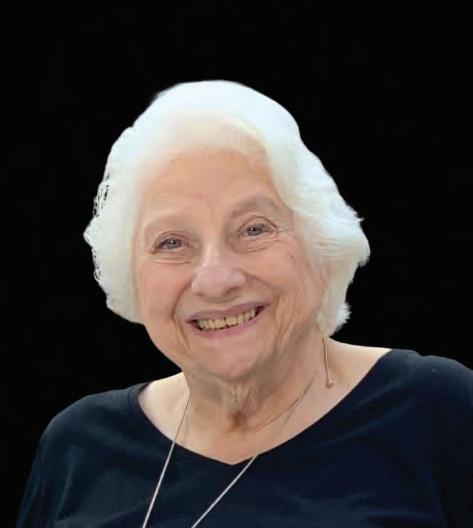
ABRAMOVITZ : Faye Iris Abramovitz (née Rubin), beloved wife, mother, grandmother, great-grandmother and aunt, passed away peacefully on May 12, 2025, in her hometown of Pittsburgh, at the age of 91. Born on Nov. 11, 1933, in Pittsburgh, Faye was the cherished daughter of Sam and Frieda Rubin. On Sept. 8, 1951, she married the love of her life, Fred Abramovitz, shortly after his service in the United States Army. Together they built a life centered on family, love and enduring commitment. Faye will be remembered for her keen sense of humor, deep generosity and the joy she found in gathering loved ones around her. One of her greatest pleasures was hosting family events, where her home was filled with the aroma of her delicious cooking, the sound of laughter and the warmth of togetherness. In later years, Faye enjoyed traveling with Fred as he made his sales calls, enjoying the shared journeys and new places they explored together. She is lovingly remembered by her three sons: Steven Abramovitz and his wife, Lisa, of Pittsburgh; Jay Abramovitz and his wife, Nancy, of Chicago, Illinois; and Jeffrey Abramovitz and his wife, Fabiana, also of Pittsburgh. Faye was a devoted grandmother to Kevin, Paula, Fina, Aryel and Milan, and a proud great-grandmother to Harley, Zev and Ronan. Her legacy lives on in the many lives she touched through her kindness, humor and steadfast love. In lieu of flowers, donations may be made in Faye’s memory to organizations supporting cancer and Alzheimer’s research, the JAA, the UJC, Sivitz Hospice, Bridges Hospice. Arrangements entrusted to Ralph Schugar Chapel, Inc. schugar.com
FINESTONE: Eileen Finestone, age 90, died peacefully on May 10, 2025. Born May 5, 1935, in New York City to Shirley and Louis (Joe) Sandfelder. Eileen grew up in Sunnyside, Queens, New York, and graduated from Mount Sinai Hospital School of Nursing and became a registered nurse. She continued her education at Hunter College, NYC where she received


her Bachelor of Science in education. Eileen was the beloved wife, for over 50 years, of the late Dr. Stephen Finestone, the loving mother of Mark (Cindy), Scott (Rebecca) and Ross (Angela). “Silly Grandma” to Deborah, Edward, Hannah and Luke, she was predeceased by her adorable grandson Zachary and her loving brother Martin and his dear wife Paula. Her brother’s family includes her devoted niece Michele, nephews David and Robert and their families. The Pittsburgh chapter of her life began in 1962 when Steve joined Montefiore Hospital. Eileen served on many boards: Ladies Hospital Aid Society of Montefiore as president, Allegheny East Mental Health & Retardation, the SelfHelp Group Network and the Medina Chapter of NA’AMAT USA. She enjoyed hobbies of needlepoint, reading, Scrabble, antique consignment shopping and boating. Eileen graduated from Duquesne University with a master’s in counseling and returned to nursing in the 1970s. She was a hospice nurse at Forbes Hospice and then worked for the Children’s Home of Pittsburgh doing adoption studies and placements. A 15-year sojourn in Vero Beach, Florida, kept her busy — while she served on the Alzheimer & Parkinson Board and volunteered at the Environmental Learning Center. She then spent five years in Pittsburgh at the Brookdale Senior Living Center in the South Hills. She enjoyed the company of friends and the caring staff. In 2021 Eileen moved to Sonata Hunters Creek in Kissimmee, Florida. Her sense of humor was “acute” at times; she loved her family, friends and the many lovable dogs that filled her home over the years. Eileen had a warm smile that brightened the room and a welcoming personality that ensured she never met a stranger. Graveside services and interment were held at West View Cemetery of Rodef Shalom Congregation. In lieu of flowers, the family appreciates donations in Eileen’s honor to the Planned Parenthood of Pittsburgh, 933 Liberty Ave, Pittsburgh, PA 15222.















Please see Obituaries, page 20 D’Alessandro Funeral

Cindy Lebenson
Jon D Levenson
W Levenson
Susan Melnick .Dorothy Natterson Maas
Leslie Ripp
Karen K Shapiro
Anchel Siegman
Eileen Snider & Family .Ed Snider
Sunday May 25: Dr Henry H Black, Abe Bortz, Ida Eisen, Mollie Klater, Macy L Leuin, Sophia Meyer, Irwin Pariser, Betsy Sachs, Milton Sadowsky, Henry L Schutzman, Herman S Schwartz, Mary Sinaikin, Meyer J Slotsky, Benjamin Solomon, Harry Tyson, Bessie Chait Weinberg
Monday May 26: Henry M Abrams, Maurice D Azen, Joseph H Breman, Isadore Brody, Irving Caplan, Ralph Covel, Theodore T Davidson, Harry Feldman, Lawrence R Katz, Jennie Kramer, Donald W Levenson, Anna Levy, Eva Cohen Roth Levy, Martin Lewinter, Bertha Esther Miller, Raymond Rosenson, Samuel Schwartzman, Lillian Staman, Jeanette Stern, Clara Stevenson, Rebecca Zwibel
Tuesday May 27: Gustave J Bloch, I Aleck Brand, Lillian Braun, Henry Cramer, Meyer M Diznoff, Pesach Aaron Katz, Shirley Kress, Dorothy Natterson Maas, Edward Pearlstein, Abe J Perlman, Mollie Reich, Emil Rosenthal, Rose Steinberg, Rose Stern, Esther Miller Swartz, Esther Weinberg, Milton Saul Weinberg, Rachel Dugan Weisberg, Elinor Young
Wednesday May 28: Ruth W Braude, Lillian L Halpern, Jennie R Jacobson, Herman Lee Krouse, David Louff, Louis Mandell, Frances Simon, Dolores M Stein, Dora Stein
Thursday May 29: Bessie Averbach, Saul Caplan, Helen Unger Casar, Frances Fink, Louis Aaron Gernstat, Milton M Goldstone, Sidney Harris, Mollie Greenberg Kalson, Esther Leipzig, Ben H Liepack, Saul Linder, Adele Lundy, Kathryn Friedlander Miller, Dora Weiss Nach, Joseph Price, Pearl R Regenstein, Benjamin Saunders, Bessie Srulson, Saul Waxler
Friday May 30: Fay Caplan, Lee Chajson, Myra Freeman, Robert Glasser, Tillie Helfant, Maurice Kramer, Elaine A Lefkowitz, Sam Moldovan, Jacob S Rush, Dora Fineberg Smith, Morris B Weiss, Lilyan Wiesenthal
Saturday May 31: Ida Borovetz, Rose C Cody, Samuel William Corn, Louis L Edelman, David Eisenberg, Bessie Finkelstein, Eva Gold, Marsha Goldman, Lena Herr, Rose Gordon Labowitz, Sylvia A Livingston, Frank L Mandell, Julius Nydes, Jo Anne Persons, Hyman Roth, Milton M Ruttenberg, Harry Siegman, Leonard Silverblatt, Harry F Skirboll, Manuel Solomon, Yetta Spodek, Hedwig Stern, Jerome Supowitz, Abraham Swadow
By Grace Gilson | JTA
Aman appointed to an advisory committee by Chicago Mayor Brandon Johnson has stepped down amid outcry over a 2023 video of him tearing down Israeli hostage posters.
Ishan Daya was one of 20 appointees to Johnson’s new Chicago Fiscal Sustainability Working Group. His website identifies him as a community organizer focused on public safety and mental health.
The announcement from the mayor’s office sparked outcry from Jewish groups including the Anti-Defamation League and Chicago Jewish Community Relations Council, as well as Debra Silverstein, a city lawmaker who called the pick a “deliberate slap in the face to the Jewish community” in a statement posted by the JCRC.

of the city’s Jewish community. Johnson has received criticism for supporting an early resolution calling for a ceasefire in Gaza, calling Israel’s r against Hamas “genocidal,” and donning a keffiyeh, a traditional Palestinian headscarf, at an event to mark Arab Heritage Month.
Last October, Johnson also drew fire from the Jewish community when he waited days to condemn the shooting of a Jewish man walking to synagogue in West Rogers Park, a heavily Jewish neighborhood, and failed to mention the victim’s Jewish identity.
“The mayor seems determined to surround himself with people who peddle hate and division,” said Silverstein. “His repeated disregard or the Jewish community is both painful and unacceptable. We deserve better.”
The video of Daya tearing down a poster of an Israeli hostage had previously come to light when he mounted an unsuccessful run for local office. In a statement to the Jewish Telegraphic Agency, Daya said he would be replaced by a
He apologized for tearing down the poster, whose wording he also called “racist and dehumanizing.” The posters, which bore the names and photos of the 250 hostages taken in Hamas’ Oct. 7, 2023, attack, were put up in cities across the United States, and often torn down by anti-Israel activists.
“I understand that my actions in 2023 caused pain within some members of our Jewish community, and for that, I am truly sorry. While I took issue with language on the
hurtful to families longing for their loved ones’ return and I genuinely apologize,” Daya said in the statement.
“I’ve spent my career working across lines of difference, and anyone who has worked with me can attest to my deep opposition to antisemitism, hate, and bigotry in all its forms,” Daya continued.
Daya’s resignation, hours after he was appointed, is the latest moment of friction in a sour relationship between Johnson and much
The Daya appointment wasn’t the only recent trouble for Johnson, who is deeply unpopular with voters. On Monday, the mayor, who is Black, received a letter from the U.S. Department of Justice alerting him that he was under investigation for allegedly hiring on the basis of race.
The letter, sent by Assistant Attorney General Harmeet Dhillon, cited statements made by Johnson at a Chicago church on Sunday in which he listed the number of Black officials in his administration. PJC
By Grace Gilson | JTA
Organizers of Eurovision are defending its voting system after several coun tries’ broadcasters raised questions about Israel’s victory in the international song contest’s audience poll.
Israel’s Yuval Raphael took second place in the widely-watched contest last weekend, buoyed by a runaway first-place finish in the audience vote, in which viewers in the competing countries can cast ballots up to 20 times for their favorite songs, at the cost of about a dollar per vote.
Raphael came to the contest bracing for anti-Israel protests, including during her performances. Now, her success has public broadcasters in a range of European countries demanding that the European Broadcasting Union, which runs Eurovision, conduct an audit of its televoting system. Some have alluded to Israel manipulating the vote.
Obituaries:

of points from the audience vote in Spain and Belgium despite their respective juries
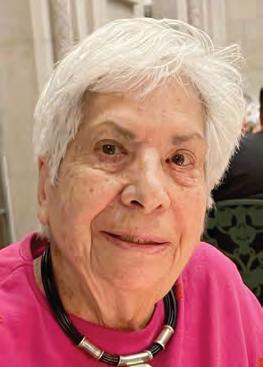
Continued from page 19
MONHEIM: Marion Altman Monheim, age 96, died in Pittsburgh on May 15, 2025. She graduated from the Winchester Thurston School in 1945, majored in geography at Wellesley College and interned at the American Geographical Society. From the time of her graduation in 1949 until her marriage in December 1950 to Dr. Leonard Monheim of Elizabeth, Pennsylvania, she lived in New York City at the Barbizon Hotel for Women and worked for the General Drafting Corporation, one of the “big three” road map publishers in the United States at the
public vote data to ensure we have a valid result.”
Since the outbreak of the war in Gaza
following Hamas’ Oct. 7, 2023, attack, Israel has faced calls to be banned from Eurovision. The Spanish and Flemish broadcasters displayed pro-Palestinian messaging during the competition, with RTVE airing the message, “When human rights are at stake, silence is not an option. Peace and Justice for Palestine.” López tweeted the same statement, along with an article claiming that the Israeli government conducted a digital influence campaign for Eurovision votes.
On Monday, Spanish Prime Minister Pedro Sanchez called for the exclusion of Israel from international cultural events, including Eurovision. He referenced Russia’s ban from the competition over its invasion of Ukraine, and said “we cannot allow double standards.”
One day earlier, Amichai Chikli, Israel’s minister for Diaspora affairs, posted a meme to X of Sanchez with a shocked expression looking at the Spanish voting results, with Israel on top.
“Sanchez, it seems the Spanish have spoken, and we have heard the slap in the face here in Jerusalem,” wrote Chikli. PJC
time. Marnie was a devoted wife, mother and keen golfer. After her husband’s death in 1971, she resumed her career. She was a key aide and confidante of Helen Bohen O’Bannon, a commissioner at the Pennsylvania Public Utilities Commission and then secretary of Pennsylvania’s Department of Public Welfare. Latterly, Marnie performed freelance assignments for Women’s World Banking in New York City, China and Kenya. She was preceded in death by her parents, Flora and Harry Altman of East Liverpool, Ohio, her husband Dr. Leonard Meyers Monheim and her sisters Lea Gail Hoffrichter and Joan Harris. She was also a niece of the late Judge Abraham Wolk, one of the principal advocates of air pollution control measures in Pittsburgh in the 1950s and a prime mover of construction of Pittsburgh’s Civic Arena in the 1960s. Marnie is survived by her two children, Charles (Janet Reid Thomas) of Edinburgh, Scotland, and Lisa (Thomas Lampl) of Ketchum, Idaho, four grandchildren and eight great-grandchildren. Arrangements entrusted to Ralph Schugar Chapel Inc. schugar.com PJC

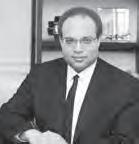





Smith-Rosenthal Team
Jason A. Smith & Caryn Rosenthal
Jason: 412-969-2930 | Caryn: 412-389-1695 Jasonasmith@howardhanna.com Carynrosenthal@howardhanna.com






























































Friends all around
The Friendship Circle of Pittsburgh hosted its annual Friends All Around gala. The May 18 event celebrated 27 graduating seniors and disability inclusion at The Westin.

For more than 500 years, Jews worldwide have marked the 18th day of the Hebrew month of Iyar (also known as Lag B’Omer, the 33rd day of the Omer) with outdoor festivities, gatherings and bonfires. Though the latter was substituted for smaller safer alternatives (students created representative bonfires from chocolate spread, pretzel sticks and Fruit Roll-Ups), fun was still blazing when Community Day School, Hillel Academy of Pittsburgh and Yeshiva Schools of Pittsburgh

Hillel Academy of Pittsburgh Girls High School track team competed in the SWCAC-SWPAA Track and Field Championships. Apart from placing first in the Girls 1600-meter, several Hillel Academy student athletes posted PRs (personal records) during the May 8 meet.
talk


Jewish Federation of Greater Pittsburgh hosted “The Real Story of Israel: Countering Antisemitism With Facts.” The May 19 program featured remarks from H. Arnold and Adrien B. Gefsky Community Scholar Rabbi Danny Schiff.



WITH GEFSKY COMMUNITY SCHOLAR RABBI DANNY SCHIFF




JUN. 9, 16, 23, 30 • MON. 9:30-10:30AM
Right now, a lot of people feel angry. What does Judaism have to teach us about the power of anger? Is anger to be subdued and avoided? Or is it sometimes praiseworthy? Most importantly, when consumed by anger, what would Jewish teachings have us do?
ZOOM: $60 FOR 4 SESSIONS
TARIFFS, REPARATIONS AND INCOME INEQUALITY: THE JEWISH WEALTH AND JUSTICE SEMINARS
JUN. 17, 24, JUL. 1 • TUE. 9:30-10:45AM
Tariffs. Reparations. Income Inequality. In three seminars, Rabbi Schiff will discuss these three critical, current issues through the lens of Jewish tradition. What insights does Judaism have to offer on the intersection between wealth and justice as it pertains to these challenging concerns?
ZOOM: $55 FOR 3 SESSIONS
PSALMS: THE POETRY OF THE SOUL
JUL. 21, 28, AUG. 4, 11 • MON. 9:30-10:30AM
In this new course, Rabbi Schiff will delve into the exquisite literature of the book of Psalms. He will explore Psalms for times of crisis, comfort, fear, joy and gratitude, and will consider the enduring significance of the powerful psalms that have been embraced by Western civilization.
ZOOM: $60 FOR 4 SESSIONS
TU B’AV: ENCOUNTERING THE LITTLE-KNOWN
JEWISH HOLIDAY OF LOVE
AUG. 7 • THUR. 2:00-3:15PM
We don’t do Valentine’s Day. We do Tu B’Av. In this session, Rabbi Schiff will discuss Tu B’Av, what it teaches us about the Jewish approach to love and the renewed importance of this day for contemporary Jews.
ZOOM: NO CHARGE
